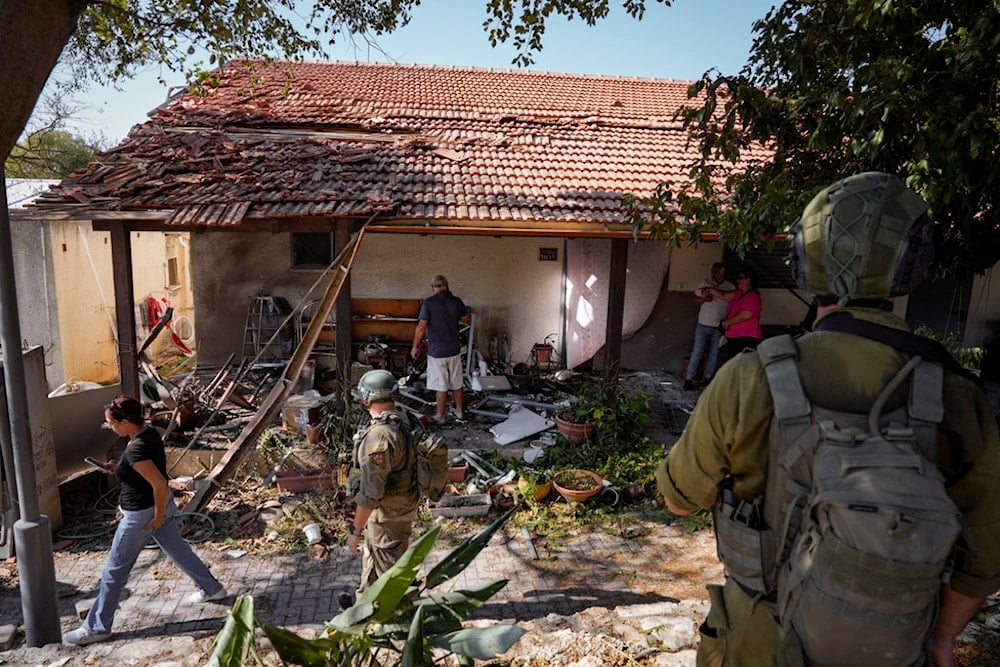Hezbollah strikes cost 'Israel' over $1bn in 2 days
The Israeli occupation is dealt numerous heavy, expensive blows as the Islamic Resistance in Lebanon continues to bombard the north.
-

Israeli occupation forces, settlers examine a house that was hit by a rocket fired from Lebanon, in Kibbutz Saar, northern occupied Palestine, on September 25, 2024. (AP)
Hezbollah has inflicted significant losses on Israeli occupation forces in northern occupied Palestine by expanding its operations. According to Israeli media, these losses have cost the Israeli occupation an estimated 4 billion shekels ($1.07 billion) over the past two days alone.
In detail, the Israeli Broadcasting Corporation (KAN) reported that the Israeli regime's strikes on Lebanon on Monday cost the entity some 650 million shekels ($173 million). Officials have underlined that if the airstrikes campaign on Lebanon protracts beyond 10 days, it would require the approval of an additional budget breach.
A reporter for the Israeli occupation's Army Radio stated, "There is no single area in Israel outside the combat zone during the past 24 hours, from Mount Hermon to the Arava Valley."
Israeli media also quoted a former official from the Shin Bet security service as saying, "The capability of Hezbollah to launch rockets towards central Israel should not be underestimated."
The former official added, "What [Hezbollah leader Sayyed Hassan] Nasrallah did today is just a small preview of what he has in store."
In an interview with the Israeli Channel 12, retired Israeli brigadier general and former financial advisor to the military's chief of staff, Reem Aminoach, said the escalating use of missile interceptors is a major factor contributing to the significant increase in daily operational costs.
"The moment these interceptors are deployed, the costs skyrocket," Aminoach said.
Aminoach further explained that the direct cost of the war amounts to roughly 130 billion shekels. However, when indirect costs are factored in, which the government will eventually need to address, the total could reach 250 billion shekels.
"This is an extremely expensive event, and the government needs to manage it properly," he warned.
Meanwhile, Hezbollah has expanded its operations, targeting Israeli military bases and headquarters with increasing precision. The attacks, which are being carried out in defense of Lebanon and its people, also serve as a show of solidarity with Gaza and its Resistance factions in light of the ongoing and mounting Israeli aggression.
In a recent analysis, The Economist highlighted that a full-scale war between "Israel" and Hezbollah represents a "nightmare scenario" for the former's economy, with a number of investors already preparing for a war that would "engulf Israel".
According to the report, such a war would severely damage Israeli economic growth, possibly even more than the impact of the Palestinian Resistance's October 7 operation.
Read more: 'Israel' no longer top destination for millionaires
A war-time economy is precarious, requiring a government to finance its military, usually through deficit spending, while maintaining enough economic strength to manage post-war debts, the report added.
However, the most alarming scenario today facing the occupation entity is that the war would extend into its key commercial centers, including Tel Aviv. Even a more limited military escalation in the northern regions could push the Israeli economy to the brink, it warned.
Military expenditures are expected to rise significantly, placing further strain on the entity's financial resources.
Adding to these challenges, Israeli banks are facing a substantial outflow of capital, as investors seek to move their funds abroad.

 3 Min Read
3 Min Read










